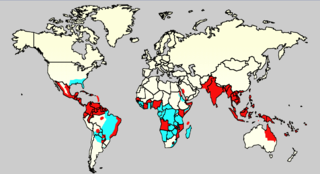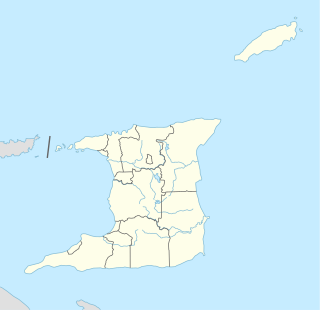Related Research Articles
Dengue fever is a mosquito-borne tropical disease caused by the dengue virus. Symptoms typically begin three to fourteen days after infection. These may include a high fever, headache, vomiting, muscle and joint pains, and a characteristic skin rash. Recovery generally takes two to seven days. In a small proportion of cases, the disease develops into severe dengue, also known as dengue hemorrhagic fever, resulting in bleeding, low levels of blood platelets and blood plasma leakage, or into dengue shock syndrome, where dangerously low blood pressure occurs.

Mahikeng, still commonly known as Mafikeng and previously Mafeking, is the capital city of the North-West Province of South Africa.
Mafeking or Mahikeng is the capital of the North West province of South Africa.

Mount Morgan is a town and locality in Rockhampton Region, Queensland, Australia. The town was the administrative centre of the Mount Morgan Shire until March 2008, when it was amalgamated with neighbouring local government areas to form the Rockhampton Region.

The Siege of Mafeking was a 217-day siege battle for the town of Mafeking in South Africa during the Second Boer War from October 1899 to May 1900. The siege received considerable attention as Lord Edward Cecil, the son of the British prime minister, was in the besieged town, as also was Lady Sarah Wilson, a daughter of the Duke of Marlborough and aunt of Winston Churchill. The siege turned the British commander, Colonel Robert Baden-Powell, into a national hero. The Relief of Mafeking, while of little military significance, was a morale boost for the struggling British.

Dengue virus (DENV) is the cause of dengue fever. It is a mosquito-borne, single positive-stranded RNA virus of the family Flaviviridae; genus Flavivirus. Five serotypes of the virus have been found, all of which can cause the full spectrum of disease. Nevertheless, scientists' understanding of dengue virus may be simplistic, as rather than distinct antigenic groups, a continuum appears to exist. This same study identified 47 strains of dengue virus. Additionally, coinfection with and lack of rapid tests for zika virus and chikungunya complicate matters in real-world infections.

La Trinidad, officially the Municipality of La Trinidad, is a 1st class municipality and capital of the province of Benguet, Philippines. According to the 2015 census, it has a population of 129,133 people.
In the 2005 dengue outbreak in Singapore, a significant rise in the number of dengue fever cases was reported in Singapore, becoming the country's worst health crisis since the 2003 SARS epidemic. In October 2005, there were signs that the dengue fever outbreak had peaked, as the number of weekly cases had declined and the outbreak of this infectious disease declined by the end of 2005.

Dengue Fever is an American band from Los Angeles who combine Cambodian rock and pop music of the 1960s and 70s with psychedelic rock and other world music styles.

Trinidad and Tobago, officially the Republic of Trinidad and Tobago, is the southernmost island country in the Caribbean and is known for its fossil-fuel wealth. Consisting of the main islands Trinidad and Tobago, and numerous much smaller islands, it is situated 130 kilometres south of Grenada and 11 kilometres off the coast of northeastern Venezuela. It shares maritime boundaries with Barbados to the northeast, Grenada to the northwest and Venezuela to the south and west.

In epidemiology, a disease vector is any agent which carries and transmits an infectious pathogen into another living organism; agents regarded as vectors are organisms, such as intermediate parasites or microbes. The first major discovery of a disease vector came from Ronald Ross on 20 August 1897. Sir Ronald Ross discovered the Malaria pathogen when he dissected a mosquito.

The 2009 Bolivian dengue fever epidemic was an epidemic of dengue fever which struck Bolivia in early 2009, escalating into a national emergency by February. The BBC described it as the worst outbreak of dengue fever in the country's history. At least 18 people died and 31,000 were infected by the mosquito-transmitted arbovirus.

As of 2010 dengue fever is believed to infect 50 to 100 million people worldwide a year with 1/2 million life-threatening infections. It dramatically increased in frequency between 1960 and 2010, by 30 fold. This increase is believed to be due to a combination of urbanization, population growth, increased international travel, and global warming. The geographical distribution is around the equator with 70% of the total 2.5 billion people living in endemic areas from Asia and the Pacific. Many of the infected people during outbreaks are not virally tested, therefore their infections may also be due to chikungunya, a coinfection of both, or even other similar viruses.

Mayaro is a town in Mayaro County on the island of Trinidad in Trinidad and Tobago.

The South African Railways Class GM 4-8-2+2-8-4 of 1938 was an articulated steam locomotive.
Liberia is one of the poorest countries in the world. Civil wars have killed around 250,000 people and displaced many more. The wars ended in 2003 but destroyed most of the country's healthcare facilities. Recovery proceeds but the majority of the population still live below the international poverty line. Life expectancy in Liberia is much lower than the world average. Communicable diseases are widespread, including tuberculosis, diarrhea, malaria, HIV, and Dengue. Female genital mutilation is widely practiced. Nearly a quarter of children under the age of five are malnourished and few people have access to adequate sanitation facilities. In 2009, government expenditure on health care per-capita was US$22, accounting for 10.6% of total GDP. In 2008, Liberia had only one doctor and 27 nurses per 100,000 people. It was ill-equipped to handle the outbreak of Ebola in 2014 and 2015.
Samuel Badree is a Trinidadian cricketer who plays internationally for the West Indies. He is a right-arm leg-spin bowler.

The effects of climate change on humans are far reaching and include effects on health, environment, displacement and migration, security, society, human settlement, energy and transport. Climate change has brought about possibly irreversible alterations to Earth's geological, biological and ecological systems. These changes have led to the emergence of large-scale environmental hazards to human health, such as extreme weather, ozone depletion, increased danger of wildfires, loss of biodiversity, stresses to food-producing systems and the global spread of infectious diseases. In addition, climatic changes were estimated to cause over 150,000 deaths annually in 2002, with the World Health Organization estimating this number will increase to 250,000 deaths annually between 2030 and 2050.
The Dengvaxia controversy, also known as the Dengvaxia issue and Dengvaxia mess, in the Philippines involved a vaccination program run by the Philippine Department of Health (DOH). The DOH vaccinated schoolchildren with Sanofi Pasteur's Dengvaxia vaccine against Dengue fever.

Ortoire is a village in Mayaro County on Trinidad Island. It is named after the adjacent Ortoire River. The village dates to at least the 1880s or a few decades earlier. Ortoire is just west of the peninsula of Point Radix, named after a French immigrant granted an estate there in 1783. The village's beach at the mouth of the river provides shelter to ocean-going fishing boats. The village was not listed in the 1901 census, but was believed to have "a few hundred people" then. The village is within the Ortoire Municipal Corporation, a political subdivision of the Mayaro–Rio Claro Regional Corporation, a political region of Trinidad and Tobago that replaced the historical county of Mayaro in 1991. The Ortoire Municipal Corporation includes the Point Radix peninsula and is bounded by Mafeking on the west, St. Joseph Village on the south, and the Atlantic Ocean on the east and north.
References
- ↑ "Welcome to Mafeking Village". Trinidad Newsday. Retrieved 4 April 2013.
- ↑ "Mafeking residents fear dengue outbreak". Trinidad Guardian. Retrieved 4 April 2013.
| | This Trinidad and Tobago location article is a stub. You can help Wikipedia by expanding it. |